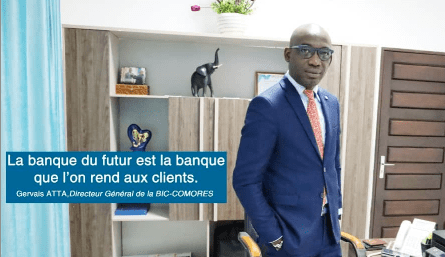The Ivorian banker who has been operating in the Indian Ocean in recent years shares a different perspective on the banking world in Africa. A look that starts from the evolution of relations between bankers and clients which would benefit from being demystified so that “everyone finds what they are looking for”. On the sidelines of the inauguration of a new branch of the Bank for Industry and Commerce of Comoros (BIC-Comores), a subsidiary of Atlantic Financial Group, Gervais Atta receives in his office decorated at the same time sober and elegant. Despite this inauguration with great fanfare, which saw the visit of the CEO of Atlantic Financial Group, Léon Konan Koffi, to the Moronian capital, Gervais Atta energetically recounts his first apprehensions of the banking world. “For me it was a hostile job”, confiding that I have long perceived banks as “institutions that ruin instead of supporting”.
While his neat dress code places him in the universal archetype of the ruthless banker, his speech today is on a whole different level. “Each customer is a new human experience,” he says with conviction. The new CEO of BIC-Comoros insists on the “human contact” that a bank must maintain with its customers. He points to the relationships between banks and customers that he considers “biased” because “of a crisis of confidence born of certain banks which have closed in Africa as elsewhere, of the lack of quality in the management of accounts, but also complicity between banker and usurer ”. For this banker who graduated from the Paris Banking School (CFPB) and an Executive MBA from the Sorbonne Business School-IAE in Paris, the solution seems unequivocal “we must demystify the bank in order to be able to establish a relationship of trust. “.
Demystify and democratize
If the cartoons and even the Hollywood films present the banks as ruthless institutions, Gervais Atta defines above all a bank as “a place where one meets men and women of all social classes, billionaires, as young entrepreneurs. , and each of these people is a rewarding new project. This is what makes the banker versatile. “He would like to point out that” The procedures sometimes force us to keep a stature that can be criticized, but the banker remains above all human. Our job pushes us to embrace projects and put ourselves in each client’s shoes while inviting them to review their copy if necessary. The banker must be able to understand, but his decisions must be based on procedures. Without that one might be a banker, but one can very quickly become a bad banker ”. In addition, sub-Saharan Africa has a strict banking rate of 19.3% in 2018 according to the Report on the situation of financial inclusion in the WAEMU 2018. This is one of the highest banking rates. weak in the world. If it is useful to specify that some countries stand out more than others, it is still necessary “to go to customers to explain to them that a bank is not rocket science, even if it seems prestigious” explains Gervais. Atta. In his professional career in West Africa and the Indian Ocean, the banker has put his approach into practice by focusing on innovation such as the launch of mobile banking in the Comoros, and the digital transformation of services and products. in Madagascar and Côte d’Ivoire. Yet African cultural barriers, such as “the appetite for cash in Africa” can act as a brake against banking, he specifies before adding the “fear” of modern and dematerialized tools. Optimism, Gervais Atta always places the solution in the hands of the banker who must “take his pilgrim’s staff” and reach out to the customer by “speaking his language” and with innovative and adapted solutions to gain his trust. A success story comes to mind, that of the mobile banking M-pesa launched in neighboring Kenya in 2007 and which has allowed “to increase the rate of banking from 12% to 70% thanks to confidence and innovation ”he shares.
“The bank of the future is the bank that we give back to the customer”
His definition of a good bank? “It’s an innovative bank that takes into account its times and times to make life easier for customers. »He specifies without hesitation. He justifies himself by noting that “it is all of this that allows us to move away from the traditional banking system and towards a modern banking system that is faster and more responsive to customers and even prospects. It is also a bank that accepts the development of its customers in the interest of all “. He explains himself amused “if I were Ali Baba’s banker when he sold two boxes, I am sure that this loyalty between client and banker would have been maintained and that I will be the banker of the billionaire he is today” hui ”. Gervais Atta speaks of a good bank as being “figital” by illustrating the ideal of “being able to align a sacrosanct mixture of the physical, which calls for traditional banking, and the digital which calls for change. “A process accelerated by the COVID-19 pandemic which” imposed a new way of seeing the bank on us. This experience has shown us that we can do banking operations in Africa without traveling. Which saves time and money for the customer “.
For the Ivorian banker, African banks must maintain this new way of working even after the crisis because “the obligation to win is for everyone”. Visionary, for Gervais Atta, this development paves the way for the bank of the future, which he describes as a “bank that we give back to the customer” by making it possible to “transform the customer into his own banker” on the basis of three key words “Proximity, security and speed”. At BIC-Comores, Gervais Atta aims to implement this trinity by focusing on the proximity of customer contact points, such as increasingly decentralized agencies, in this archipelago of more than 850,000 inhabitants.



